Anatomy of an Era: David Alderman, Part 1
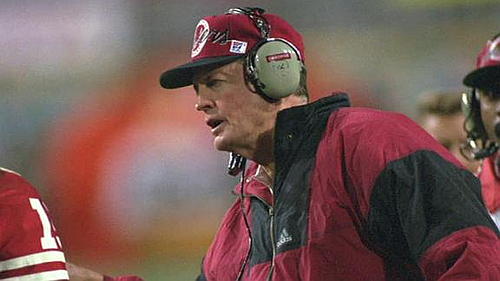
Excerpted from Chapter 85, No Place Like Nebraska: Anatomy of an Era, Vol. 2 by Paul Koch
People seek activities where they can pursue three essential things: they want autonomy in their work, they want to develop a mastery in their performance of the work, and they want to take on and play a part in something bigger than they are.
-Walter H. Bock summarizing Drive, by Daniel H. Pink
In a bit of personal revelation, you must know that one of my all-time favorite television comedies is CBS’s The Big Bang Theory. It’s where scientific fact and mathematical theory is relentlessly confronted with real life practicality, odd human foibles interjected. Catering to my odd sense of humor, hilarity always ensues. You may have heard of the old computer operating mantra of Garbage In = Garbage Out (GIGO), meaning that whatever you put into something -be it a business venture, a task, a relationship, a software program, any system of outputs- one should reasonably expect the end result to be an aligned, more refined product of its original. At least that’s the theory, anyway. The same applied when it came to summer end’s mass influx of football freshmen in Lincoln. Within weeks, though, the ‘garbage’ pool of talent (loosely termed) weaned itself from the team, more or less. Sure, there were injuries and issues outside of many a student-athlete’s control, so we must also give some the benefit of history’s doubt.
One such individual falling under that designation would have to be Dave Alderman. Despite flashes of brilliance, Dave’s body rebelled, forcing him to accept a lesser performance role on the team throughout his career. But he found other ways to contribute, as most do. Walk-on or scholarship player, it made no difference, as they all played their necessary and no doubt crucial part in the sum of the whole.
To wit, I recall my freshman year at the University and my own attempt to walk-on. I’ll never forget the scene: myself and Boyd Epley talking about upcoming performance testing and what scores and speeds I would need to achieve to make the squad. Meeting inside the front doorway of the old West Stadium Strength Complex, Boyd faced me straight up and put it frankly and succinctly: “Paul, it all comes down to this: Are you good enough to be on the field to help us beat Oklahoma?” The question stopped me in my tracks, because I knew the honest answer was a ‘No.’ Instead, I stood in dumbfounded silence. To drive home his point, Boyd closed with, “You know, you can’t make chicken salad out of chicken sh!*t: you need the real chicken.” Point taken, Boyd. Point well taken.
And if you must know, around that time in the late-80’s there was a derisive term used by a select few strength and conditioning staffers to pigeon-hole the players who would rarely, if ever, make the game day field, merely spending their careers as tackling dummies and scout team fodder. These players were called ‘Turds,’ though never to their faces. (As a quick aside: I would have been a fantastic Turd had I made the roster) But as the 60 & 3 era rolled around some of those personalities were encouraged to seek greener pastures. I’d like to think that this sort of stinkin’ thinkin’ exiting the program could only have helped with the unity of the organization, because the ‘Unity, Belief, Respect’ mantra soon made headway in a big way. Let’s give a listen to one whose adherence to the ‘Unity, Belief, Respect’ credo and his immense faith helped him re-write the code of the 60 wins & 3 loss Cornhusker Football era: Dave Alderman.
Notable quote #1:
“I remember one instance, the first time (Coach Ron Brown) said, ‘I know this isn’t easy. If it was, everyone would be out here. All your friends are probably sitting around the pool and everything else, and you’re out here working your tail off. But believe me, when it’s Saturday afternoon they will all be wishing they were here.’ ”
David Alderman
Walk-on, Cornerback, Omaha, Nebraska (North)
Where are they now? Rochester, Minnesota, Engineer
Question: Hey, David. I tell you what, it’s been fifteen years’ time since talking to some of you guys, and it frightens me to think you’re parents and all. (laughs) You know what I’m talking about?
David Alderman: (hysterical laughter) Oh yeah. Or that they found a wife to put up with them…
Q: Exactly. Like society actually trusts them with children…(laughing)
DA: Right, right…
Q: Where did you grow up?
DA: Well, I was born in Omaha and my dad took a job out in Salt Lake, so we were there for eight or nine years, and then we moved back to Nebraska. So fourth grade through high school I stayed in Nebraska.
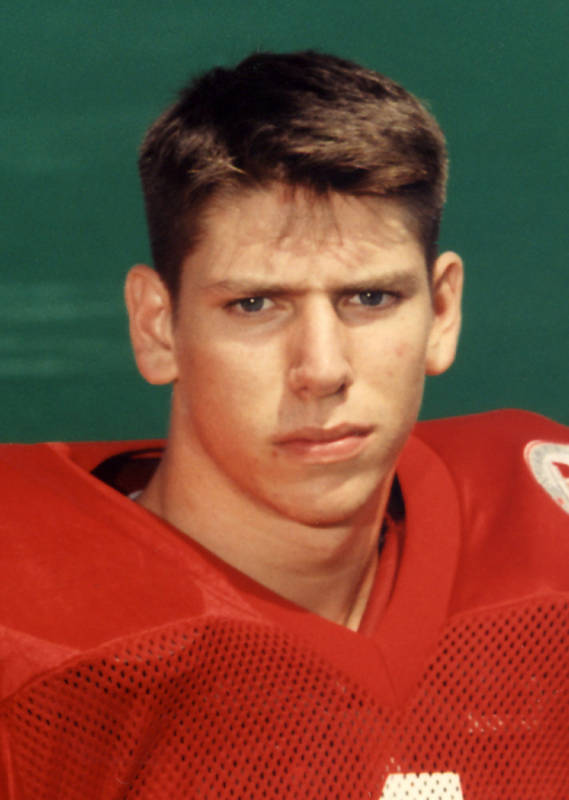
And actually, my family moved down to Dallas, Texas just before my senior year in high school. So the summer between my junior and senior year, my family moved to Texas and I ended up staying with a friend of mine and then graduated from there (in Nebraska). And then I went on the the University of Nebraska, and that almost didn’t happen.
Q: Tell me how?
DA: Well, I got asked to walk on for football both at the University of Texas and the University of Nebraska. So I’d gone down to Texas and had gone to their orientation for all incoming freshmen and had all my classes signed up for and everything. Then with about -I don’t know how long before training camp- but for some reason I sat down and made a pros-and-cons list of Nebraska versus Texas and I had a whole page of stuff. And I took it to my Dad and we’re talking and he looked through it, and I said, ‘I really can’t decide.’ And he said, ”What does your heart say?” And I said, ‘My heart bleeds Nebraska red.’ And he was like, “Alright.” So I think it was two weeks before training camp I decided to go to Nebraska. (laughs) So I showed up to training camp and had to sign up for classes. I had to get up at six o’clock one morning during training camp one day to sign up for my classes.
Q: What high school did you attend?
DA: Omaha North. Me and Clinton Childs were teammates in high school, and then Ahman Green, even though he graduated from Central. He was at North High School for his freshman and sophomore year, so I knew him.
Q: When was your first fall camp?
DA: It would have been the fall of ’92.
Q: Can you recall some of the pros on that piece of paper that made you choose Nebraska over Texas?
DA: Well, one of the big things for me coming from Omaha North -and I was a Fellowship of Christian Athletes Huddle leader at Omaha North, and through my Coach Lee, (the head of the FCA at North) he knew Ron Brown- and I’d read some of the Victory magazines that had articles on Osborne and Ron Brown and thought, ‘How cool would that be to be part of a program where these two guys are running it and in charge?’ What an opportunity to be mentored by that type of coach, coaches who knew football is good and you want to win and you want to do your best and all of that, but at the end of the day it’s not what matters.
So that’s the mindset I had and I knew that was the mindset of those coaches, where it wasn’t a program that was a “win-at-all-costs” program and “the end doesn’t justify the means.” That meant a lot to me. And actually, when I was leaving high school –this will sound silly- but for some reason I felt in my heart at the time that my calling was to not only go on and play in the pros, but also be an FCA rep, so I thought that was my chance to work with those guys and make a few network connections. Obviously, that didn’t all work out, but if you would have asked me coming out of high school what I was going to be when I grew up, that’s what I would have said.
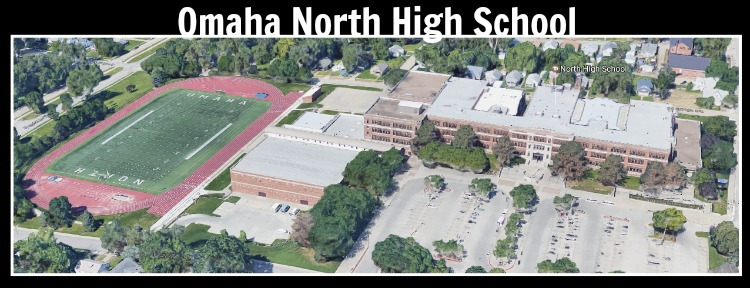
And graduating from Omaha North, I knew I would have friends around. Not all my friends, because when you leave high school everybody just scatters. If I’d have gone to Texas I’d have been close to my family, but I wouldn’t have known anybody. And you don’t go to Nebraska because you’re hoping to go to the Sun Bowl, you know what I mean? (laughs) Growing up and watching them play on January 1st, between Christmas and New Year’s, I just loved that. And the Oklahoma games were such big deals -the families would get together and all- and being part of that on the field, that whole situation, being involved in that, I wanted to be involved with that. Even though Texas has a rich tradition, too, growing up in Nebraska was much closer to home.
Q: What were some of the pros of the Texas side of the paper?
DA: Even though I didn’t grow up in Texas, you knew that if you were a part of the UT you would have however many millions of people in that fan base, and that wouldn’t be bad. But they had a rich tradition, too, a lot more than I knew. And it was pretty amazing how far back things went and the rivalries and everything. And they were also rated number four in electrical engineering at the time, and that was what I was looking into. So when you graduate from UT you’d have a good resume and get yourself into a lot of different companies, so that was a big thing pushing me toward that, plus the family thing.
Q: From your limited knowledge of comparing the two, were there any major organizational divergences, the culture, the atmosphere among what you saw of the two programs?
DA: I would say the UT people were -I’m not going to say ‘arrogant’- but they were a proud people, a proud bunch. (laughs) A lot of people carry the torch for football and all. Football in Texas is like hockey in Minnesota.

Available on Amazon.com
Q: So, you’re a freshman on campus in ’92 and meeting up with the other freshmen. What stood out to you about those first few days? Any surprises? Crazy revelations?
DA: I would say the size of the other athletes. Speed, too. It was the talent, size and speed of the other guys coming in for football. I didn’t know this guy at the time, but Marvin Simms from Apple Valley, Minnesota, I think – I think that was his name- I was walking behind him as he was carrying his stuff up into the dorm room and I was like, ‘Holy cow!’ He was ripped from head to toe, just nothing but muscle. I was, ‘Alright, this is the level I’m going into.’ In high school we had three or four Division One guys coming out of high school, but to be at a level where everybody is that good and that built and everything else, that was kind of eye-opening. And the tempo. The first day of practice, that tempo. Everything moved so fast. It was a major shock.
Q: In what regard?
DA: I remember we were doing it -and I thought we were doing it pretty fast- and Osborne goes, “Come on guys. Pick up the pace. You guys are in for a rude awakening once the varsity gets here.” And we were like, “This is faster than anything we ever did in high school.” And we knew what he was talking about once the varsity reported. Holy smokes, it was bang-bang-bang-bang! I remember thinking, ‘Holy cow!’
Q: So when the older guys showed up, was there anybody who made a big impression on you?
DA: Well, I started off as a wide receiver that fall on the scout team then that spring they had a lot of people graduate on the defensive side of the ball, so me and Chad Blahak and somebody else switched to defensive back in the spring.
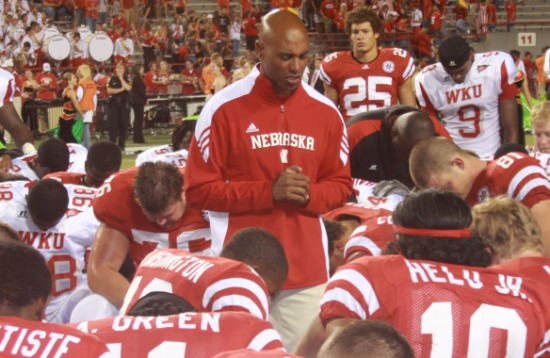
Q: So you started off with Coach Ron Brown?
DA: Yeah, I think the world of Coach Brown. He spent his time with everybody. He pushed you hard, but it’s one of those things where he wasn’t just a task master up in a tower yelling things down at you, right? He was the one, a lot of times, taking you off to the side and doing extra drills with you. He was the one, also, at the end of the day sitting down with us to stretch and giving us words of encouragement and everything else. I remember one instance, the first time he said, “I know this isn’t easy. If it was, everyone would be out here. All your friends are probably sitting around the pool and everything else, and you’re out here working your tail off. But believe me, when it’s Saturday afternoon they will all be wishing they were here.” So we’d kind of sit in a circle and he stretched with us, so I thought that was really cool.
The people who really impressed me that first year would have all been receivers. Corey Dixon was there, and he was so quick! I don’t know if he had blazing speed going straight down the straight away like Tyrone Hughes, that was his calling. But Dixon, man, he could shake anybody. He just blew me away. He wasn’t very tall, like 5’8”. I was taller than him -and I think he went on the play for the Falcons- but how anybody covered him is beyond me. (laughs)
Abdul Muhammad was another one, a slot guy who was so tough. He was a skinny rail-type guy, but he would go across the middle and catch anything and he stood up to anybody. He would impress me. Tom Werner from Tilden, number 87, he ran the best routes and could catch anything. I patterned myself a little bit after him, because he never wore gloves. No matter how cold it got, he never wore gloves, so I never wore gloves, too. (laughs) So he was a guy that I tried to kind of pattern myself after, because he ran such great routes and had great hands. I tried to emulate him.
Q: I talked to Corey some months ago and told him that ’93 season, the Florida State Orange Bowl, I viewed him as a warrior after seeing his performance that game, and he said that he’s never ever watched the replay of that game.
DA: Oh, I don’t blame him. I’ve never watched it, either. Funny, I was moving things around a month ago and I found an old Sports Illustrated, and so I decided to torture myself and read it. And the funny thing was, even after that game they mentioned that “there really is no clear-cut number one,” and they gave clear-cut reasons why Nebraska should still have been national champions after that game. The writer made the case for Notre Dame, Nebraska and Florida State all being national champions, even after Florida State had beaten us.
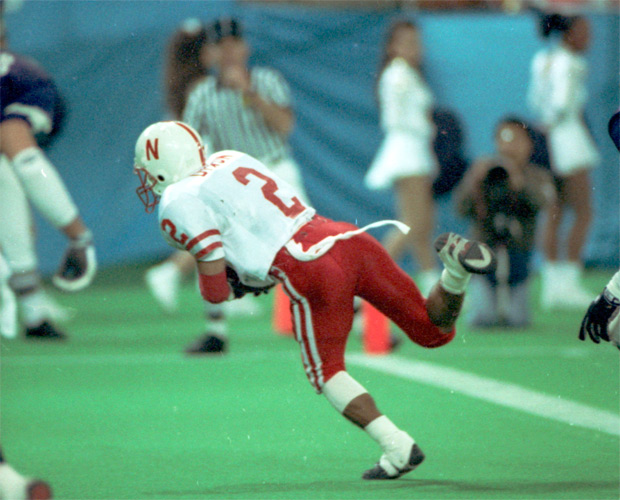
Q: Or they rather outlasted us, Dave. They won the game, but they didn’t beat us.
DA: Yeah, (laughs) Coach Bobby Bowden even said that. I don’t know if they were the first words out of his mouth but he said, “They outcoached us and they outplayed us, but we won the game.” That was a direct quote from Bowden.
Q: So then you made the switch over to the defensive side. Coach Darlington was your coach then?
DA: Yes, Coach Darlington. It was a little different. I wouldn’t say he was more ‘out of touch’-because he meant well and that kind of thing, and I don’t know if it was that he was very cerebral- but it was different. I can’t put my finger on it, to be quite honest. I loved and enjoyed defensive back and to this day I very much value the defensive backs whenever I watch football. My heart is definitely on defense, and specifically on defensive backs. I much more appreciate the defensive side of the ball.
Q: In working under Coach Darlington, what stood out to you?
DA: The one thing I think -and maybe it wasn’t true for the entire staff- but Coach Darlington was definitely a believer. And I always respected that about him. And I don’t know if I would say ‘enjoyed‘ it, but it was a thing where, ‘Here’s a person I’m subject to, and this person is subject to Christ.’ So it was easier for me personally to do the things they asked me to do. I knew they weren’t going to do or say whatever it took or whatever ends justified the means. I knew in the end that football wasn’t all that important, so that was one thing I knew from listening to him talk. I was more than happy, very thankful to have a coach with that perspective.
Q: Any particular sayings or idiosyncrasies or quotes that Coach Darlington was apt to repeat?
DA: Oh boy, I wish I could think of some of them right off the top of my head. I know there were, because we always used to make fun of them. (laughs) It’s killing me. They’re just locked away right now, but they’re there. If I think of any or remember some I’ll definitely send you one on Facebook.
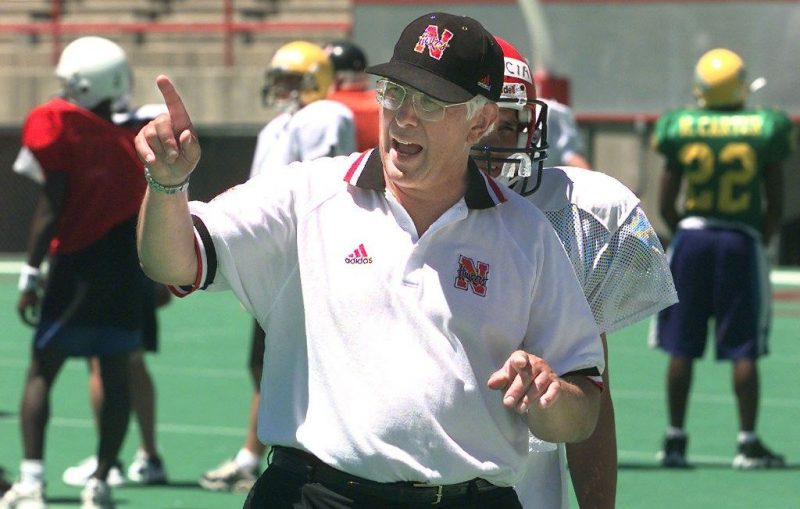
Q: Let me ask you, David, during the week where were you in the slotting, the pecking order at practice?
DA: Well, it’s kind of a ‘hard luck story’, but I had my chances to become a starter. But it just never worked out physically, with injuries and stuff like that. As a receiver I was redshirting and out there, but then came spring ball and I moved to defensive back. At the end of all the testing I was in the top five for the whole team in three areas: the shuttle run, the ten yard dash, and I want to say vertical jump. I was like, ‘Okay, here we go!’ So I get out there and I’m on the second team and go out there for the second team punt block (and I got two of them), then had a hamstring pull in the middle of spring ball, and that thing just rode me all the rest of my days there at Nebraska. I was never really able to fully realize, if you will, the potential I had. I think I pulled that thing about 5 different times, and I pulled a quad another time. Otherwise I was a second-team guy with all the chances in the world to start. Coach Darlington said going into my senior year that I could start and things. All the pieces were there, but the puzzle just never fell into place.
To be continued tomorrow….
Copyright @ 2013 Thermopylae Press. All Rights Reserved.
Photo Credits : Unknown Original Sources/Updates Welcomed
Author assumes no responsibility for interviewee errors or misstatements of fact.